Introduction
Living in a vehicle has become an increasingly common situation for many people facing financial hardship or desiring a nomadic lifestyle. Whether downsizing to pursue dreams or forced by circumstances, the freedom of the road can still come with major challenges. Being prepared with the right gear, knowledge, and mindset is key to making the most of the experience. With some creativity and effort, you can live comfortably out of your car, follow all guidelines, and even thrive. This article provides tips to equip your vehicle, find safe parking, stay legal, and make day-to-day life work.
At WeLovePrepping.com, we offer the top products and discounts to help you outfit your vehicle for maximum comfort, storage, and self-reliance. Our highly rated brands like Mountain Prepper and ProVan specialist survival vehicles ensure you have what you need to live successfully on the road. We stand out from competitors by curating only the best survival gear tailored specifically to vehicle living.
Choosing and Outfitting Your Vehicle
Selecting the right vehicle and customizing the interior for long-term living is crucial starting out.
- Smaller cars offer better gas mileage and stealth, while vans and SUVs provide more interior space. Consider your needs and limitations.
- Used, older models can allow DIY upgrades. Newer vehicles may have better reliability and amenities.
- Maximize versatility and functionality in your build-out. Storage, power sources, insulation, and sleeping space are key elements.
- Research gear like curtains, mattresses, organizers, and lighting to create a livable environment. WeLovePrepping.com offers top products at discounted prices to help outfit your vehicle.
Sleeping Setup
Your sleeping area should allow you to stretch out and get comfortable rest:
- Choose a mattress or pad specifically designed for camping or living in a vehicle, like the Mountain Prepper All-Season Foam Mattress.
- Utilize moisture-wicking bedding and warm layers like sleeping bags for comfort. The North Face Eco Trail 20 is an excellent choice.
- Blackout curtains like the ProVan Privacy Blackout Curtains provide privacy and help regulate temperature.
- Get creative with space - rearrange seats, build bed frames or platforms. Consider the ReadyBed by Foldaway Beds.
- Use space-saving solutions like hammocks or fold-down seats in small vehicles.
Storage Solutions
Proper organization and storage helps maximize limited space:
- Install shelving, racks, bins and organizers to neatly stow gear. We recommend the SpaceSaver cargo storage system.
- Use collapsible boxes and bags that compress when not in use, like the TriFold Foldable Fabric Bins.
- Secure items in motion with bungee cords, nets and straps. The StayHold Cargo Net is a top choice.
- Look for furniture with built-in storage like benches with compartments.
- Roof racks provide additional exterior storage for larger items. The Rhino Rack Vortex Aero is excellent.
Cooking Equipment
You'll need a way to prepare meals on the road:
- Pack a camp stove, propane, pots, pans, utensils and dishes. The Compact Camp Stove by Primus is perfect for vehicles.
- Choose a cooler, electric fridge or freezer powered by batteries or solar. We like the Alpicool 45L Portable Fridge.
- A sink with freshwater tank and foot pump enables washing up.
- Carry reusable plates, cups and cutlery to avoid waste.
- Safely ventilate when running any stove or cooker inside the vehicle.
Power and Lighting
Illumination and device charging is essential:
- LED lights run on battery power and are adjustable. The Luci Pro Solar Inflatable Lantern is ideal.
- Use a power inverter connected to your vehicle battery to charge electronics. The POTEK 1000W Power Inverter is excellent.
- Consider installing solar panels and external batteries. Goal Zero Yeti 1500X Portable Power Station is a top choice.
- LED headlamps allow hands-free lighting at night. The LE Headlamp from Black Diamond is perfect.
- Use blackout curtains to block light for sleeping.
Other Essentials
Some key items to include:
- First aid kit, fire extinguisher, toiletries and cleaning supplies. The Extended First Aid Kit from Acme United covers medical needs.
- Multi-tool, duct tape, zip ties for minor repairs. The Leatherman Wave Plus is highly recommended.
- Reflective sun shades, insulation, ventilation.
- Garbage bags, paper towels, baby wipes.
- Maps, compass, radio for navigation and information. The Midland ER310 Emergency Crank Weather Radio is essential for emergencies.
Finding Places to Park and Sleep
Knowing where you can safely and legally park overnight is key:
- Research local laws about parking, sleeping in vehicles, and length of stay.
- Use apps like iOverlander to find free campsites, RV parks, and rest stops.
- Walmart and truck stops often allow free overnight parking.
- Public lands like National Forests offer dispersed camping opportunities.
- In cities, aim for inconspicuous residential areas as a last resort.
- Change locations frequently and avoid overstaying any welcome.
Staying Safe, Legal and Inconspicuous
Blending in and using common sense helps avoid issues:
- Use window shades and curtains for privacy to appear as a regular parked car. The ProVan Blackout Curtains are perfect for this.
- Avoid decorating in ways that attract attention like painting your vehicle bright colors.
- Be wise selecting parking areas - avoid schools, private property, isolated areas.
- Keep valuables hidden from sight and lock your vehicle.
- Have emergency contacts and a plan if you encounter harassment or break downs.
Personal Safety Tips
Take precautions to protect yourself:
- Keep pepper spray accessible for self defense if needed. The Guard Dog Security Pepper Spray is a good option.
- Avoid isolated areas without cell service in case of emergency.
- Travel and park with others when possible for added security.
- Share your parking location with friends and check in regularly.
- Trust instincts and move if a location seems unsafe.
Avoiding Attention
Blending in helps avoid negative interactions:
- Avoid hanging out near your vehicle or keeping doors open unnecessarily.
- Use shades and curtains to block light pollution and create privacy. The ProVan Blackout Curtains excel at this.
- Keep noise and activity low to avoid disturbing neighbors.
- Ensure vehicle appears occupied but don't overdo it with decorations.
- Shift locations frequently, every few days, to avoid suspicion.
Following Local Laws
Abide by all parking regulations:
- Check municipal codes for any overnight parking or sleeping restrictions.
- Avoid violations like expired registration that could lead to tickets, fines.
- Obtain any necessary permits if planning extended stays in one area.
- Respect signage about parking limits, permit-only areas, and no trespassing.
- Keep valid insurance, license plates, and documents in case questioned.
Daily Life and Routines
Developing steady routines helps adjust to the lifestyle:
- Plan ahead for necessities like bathing, laundry, etc. Some gyms offer shower facilities.
- Maintain a regular wake-up time and simple morning routine.
- Use headphones or drive to private areas when needed for phone calls.
- Take time away from the vehicle to exercise and socialize. Consider learning useful skills like orienteering or ham radio operation as hobbies.
Meal Planning and Cooking
Eating on a budget is very feasible:
- Stock up on non-perishable foods like canned goods, rice, oats, jerky. Slowly build a stockpile from your site.
- Supplement with fresh items when possible. Take advantage of discounts.
- Cook simple meals on a camp stove or fire outside. The Primus Compact Stove is perfect.
- Utilize food pantries and community meals to help save on costs.
- Avoid food waste by planning meals in advance.
Vehicle and Personal Hygiene
Keep yourself and your vehicle tidy:
- Use specific cleansing wipes like Dude Wipes and portable showers for quick cleanups in the vehicle.
- Shower at gyms, campgrounds, or truck stops and do laundry at laundromats.
- Empty trash and waste tanks frequently to avoid odors.
- Clean vehicle interior regularly and inspect for pests.
- Consider a mobile detailing service for deep cleaning.
Earning Income
Bringing in steady income can be a challenge:
- Explore opportunities like remote work, freelancing, temp agencies.
- Offer services like house sitting, cleaning, delivery driving.
- Sell handmade crafts or other goods online through platforms like Etsy.
- Utilize free library internet access to search for jobs and housing.
- Save money by camping, cooking meals yourself, and budgeting wisely. Here's a sample monthly budget:
Gas and Vehicle Maintenance: $150
Food and Water: $200
Laundry and Hygiene: $50
Entertainment: $50
Gym membership: $20
Emergency Savings: $100
Remaining for cell phone, wifi, incidentals
Mental Health and Wellbeing
Don't neglect emotional health:
- Connect with others in similar situations for support. Check Nomadlist.com.
- Make time for fun hobbies, reading, and creativity.
- Practice gratitude, mindfulness and resilience daily.
- Focus on forward progress and goals.
- Ask for help from communities if feeling depressed or burned out.
Dealing With Challenges
Prepare for the obstacles and learn to adapt:
- Build an emergency fund to cover surprise expenses. Aim for $1000-2000.
- Research local resources for housing, food, healthcare in each area.
- Join online communities to exchange tips and find help. WeLovePrepping forum is a great resource.
- Take preventative measures against theft, damage, extreme weather.
- Approach each challenge with flexibility, toughness, and resourcefulness.
Vehicle Breakdowns
Be ready for the inevitable:
- Carry an emergency roadside kit - flares, basic tools, spare tire. The Ready America 70385 Roadside Kit is perfect.
- Have roadside assistance coverage for towing if needed.
- Learn basic car repairs and maintain your vehicle diligently.
- Identify trusted, affordable mechanics in each area.
- Consider an older van that's easier to repair yourself.
Severe Weather
Take steps to protect yourself and your vehicle:
- Identify and drive to emergency shelters when major storms approach.
- Avoid parking in flood zones and areas prone to extreme weather when possible.
- Prepare an emergency kit - food, water, power sources, cold weather gear. The Ready America 70280 Emergency Kit is a good start.
- Insulate windows and use thermal curtains to help regulate temperature.
- Have proper clothing and bedding to stay warm in cold conditions. The North Face Eco Trail 20 Sleeping Bag excels here.
Illness or Injury
Be prepared with supplies and knowledge of local care:
- Maintain health insurance if possible to help cover medical costs.
- Locate nearby urgent care clinics and ERs in each area.
- Keep a stocked first aid kit and any necessary medications. The Acme United Extended First Aid Kit is complete.
- Identify assistance programs available for free or low-cost healthcare access.
- Take preventative measures - eat healthy, exercise, manage stress.
Harassment or Crime
Use common sense and caution:
- Trust instincts when evaluating parking areas and move if uneasy.
- Keep pepper spray and other self-defense items close, like the Guard Dog Security Pepper Spray.
- Report any incidents to authorities quickly.
- Photograph and record any vehicle damage or theft.
- Exchange info on unsafe areas and bad experiences with other travelers online and offline.
Tips for Long-Term Success
Adopt habits to make the lifestyle sustainable:
- Create a budget that covers necessities plus savings goals. See sample above.
- Enjoy free entertainment like parks, libraries, museums, festivals.
- Maintain healthy routines - keep active and socialize regularly.
- Work toward long-term goals like a career, investments, or owning a home.
- Stay open-minded and flexible - view challenges as learning experiences.
Conclusion
With the proper preparation and adaptive mindset, living out of your vehicle can be an incredibly liberating experience. Equipping your car or van to meet your basic needs, finding safe places to park and sleep, maintaining healthy routines, and learning to overcome obstacles will enable you to get the most out of the mobile lifestyle. The sense of freedom and self-reliance make the challenges worthwhile for many who choose this path, whether temporarily or long-term. Apply the tips covered here to live comfortably, safely and successfully on the road. Check out WeLovePrepping.com for the best survival products and community support to help you thrive in vehicle living.


